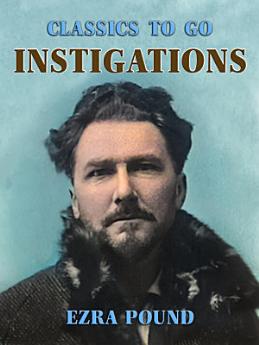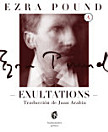Instigations
Jun 2022 · Otbebookpublishing
Ebook
270
Pages
family_home
Eligible
info
reportRatings and reviews aren’t verified Learn More
About this ebook
Excerpt: "The time when the intellectual affairs of America could be conducted on a monolingual basis is over. It has been irksome for long. The intellectual life of London is dependent on people who understand the French language about as well as their own. America's part in contemporary culture is based chiefly upon two men familiar with Paris: Whistler and Henry James. It is something in the nature of a national disgrace that a New Zealand paper, "The Triad," should be more alert to, and have better regular criticism of, contemporary French publications than any American periodical has yet had."
About the author
Ezra Pound (1885-1972) was an American expatriate poet and critic who profoundly influenced 20th-century literature. Born in Hailey, Idaho, and educated at Hamilton College and the University of Pennsylvania, Pound became a central figure in the modernist movement. His early work, characterized by its innovative use of language and form, helped to revolutionize poetry. Pound's literary contributions are vast, including the promotion of imagism, a movement that emphasized clarity, precision, and economy of language. He was instrumental in the careers of many contemporary writers, such as T.S. Eliot, James Joyce, and Robert Frost, often providing financial support and editorial advice. His editorial work on Eliot's "The Waste Land" is particularly notable for shaping one of the most important poems of the 20th century.However, Pound's legacy is marred by controversy. During World War II, he made a series of pro-Fascist radio broadcasts in Italy, which led to his arrest for treason by the U.S. government. He was declared mentally unfit to stand trial and spent over a decade in St. Elizabeths Hospital in Washington, D.C. Despite this, his work continued to be influential, and he was awarded the Bollingen Prize in 1949.Pound's revolutionary ideas extended beyond poetry to his economic and political theories, which were often controversial and provocative. His Cantos, an epic poem spanning decades, reflects his complex and often contradictory views on history, culture, and society. Pound remains a polarizing figure, celebrated for his literary genius and criticized for his political extremism, making him a subject of enduring fascination and debate.
Rate this ebook
Tell us what you think.
Reading information
Smartphones and tablets
Install the Google Play Books app for Android and iPad/iPhone. It syncs automatically with your account and allows you to read online or offline wherever you are.
Laptops and computers
You can listen to audiobooks purchased on Google Play using your computer's web browser.
eReaders and other devices
To read on e-ink devices like Kobo eReaders, you'll need to download a file and transfer it to your device. Follow the detailed Help Center instructions to transfer the files to supported eReaders.








